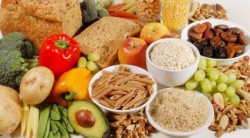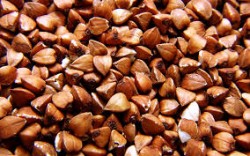0% - Gluten
0% - Sodium
0% - Chemicals
0% - Cholesterol
Magnesium, Iron
Potassium, Calcium
Fiber, Protein, Rutin
Phosphorus, Copper
Full of Fiber
Home » Full of Fiber
Buckwheat has resistant fiber
Resistant fiber is a compound shown to lower blood sugar after meals, help weight loss, reduce food cravings and improve diabetes. All versions of buckwheat contain resistant fiber, but the boiled kernels, called groats, contain the most at 6 percent or greater

Pack on the Fibre
Just one cup of buckwheat will give you almost 20 percent of your daily fibre requirements, meaning that you stay fuller for longer while warding off illnesses such as cancer.

Buckwheat is high in soluble fibre
Buckwheat is a good source of both soluble and insoluble dietary fibre. 100 grams of buckwheat will provide you with about 10 grams of fibre. Fibre helps detox and eliminate waste by speeding up bowel movements through the gut. Fibre also binds toxins and helps remove them from the body.
Potentially, buckwheat is a source of resistant starch, a type of starch that escapes digestion in the small intestine. Resistant starch is often referred to as the third type of dietary fibre because it possesses some of the benefits of insoluble fibre and some of the benefits of soluble fibre. While most of the starch in buckwheat is readily digestible, the small portion that is resistant (about 4-7%) can be highly advantageous to overall colon health.

High in Fiber
Like many grains and grain alternatives, buckwheat can add significant fibre—particularly insoluble fibre—to your diet. Foods high in fibre have been shown to potentially lower your risk of a vast array of serious conditions, including diabetes, high blood pressure, heart disease, and colon cancer. For people who are overweight, a high-fibre diet may help with weight loss. In addition, a high-fibre diet may help to alleviate certain digestive conditions, such as gastroesophageal reflux disease (GERD), ulcers, constipation, and even haemorrhoids. Research shows that the benefits of a high-fibre diet apply to both adults and children.
Buckwheat contains mainly insoluble fiber. This is the type of fiber that does not dissolve in water, which means it remains mostly intact as it moves through your digestive tract. Insoluble fiber helps to bulk up your stool, which serves to keep you free of constipation and to lower your risk of diverticulitis, a condition that can lead to infection in your large intestine.
Buckwheat also contains a small amount of soluble fiber, which does dissolve in water and turns into a gelatinous substance that your body can digest. Soluble fibre is heart-healthy and has been shown to protect against many conditions, including diabetes and high cholesterol.
Medical authorities recommend that adults get between 20 and 35 grams of fibre per day. If you eat 3/4 cup of buckwheat groats as a hot cereal for breakfast, you are well on your way to meeting that total.






















